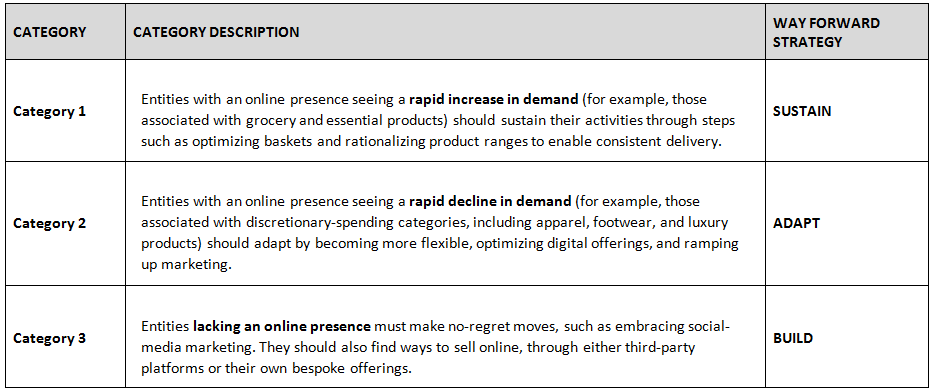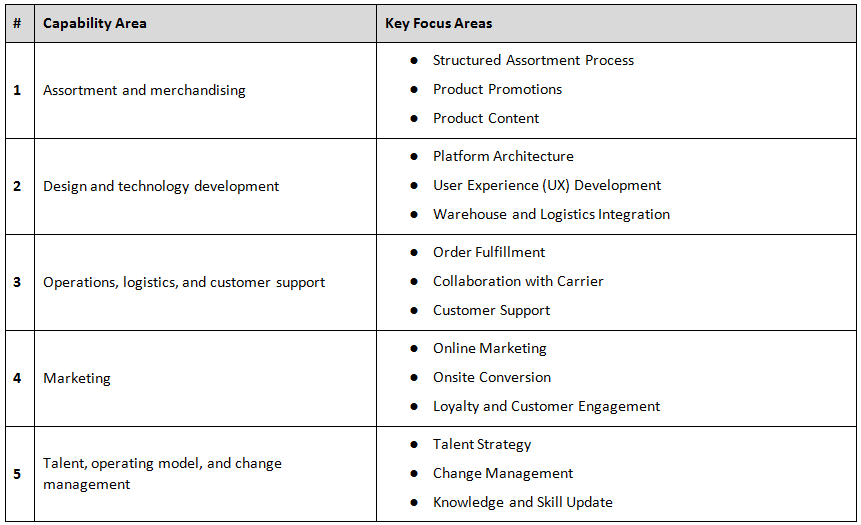E-Commerce Demystified – Key Imperatives for the Next Normal (Part 1 of 2)
March 09, 2021

COVID-19 has accelerated the GCC’s e-commerce market. Lockdowns, travel bans, and retail closures increased consumers’ online usage, and the largest retailers soon followed, in some cases selling direct to consumers for the first time. E-commerce in the Middle East is projected to be worth $48.6 billion in 2022, up from $26.9 billion in 2018, with the UAE and Saudi Arabia being the main drivers of growth, according to a report from BMI Research.
During the lockdown, consumers across the GCC dramatically increased their online spending on groceries, personal care products, and household supplies. In fact, consumers in Saudi Arabia and the United Arab Emirates have seen among the highest rates of “new or increased” users in online deliveries (restaurant products and groceries) and communications (video-conferencing and remote learning).
The best business setup consultants in Dubai observe that e-commerce is at an all-time high and it will continue to expand and garner an ever-higher share of the retail industry. Online demand will likely remain strong post-COVID-19, and retailers must adapt to the new normal. The UAE e-commerce sector is expected to see continued growth as more UAE consumers demand online payment options and merchants increasingly recognize the need for an online presence, according to the joint study, “The United Arab Emirates (UAE) E-commerce Landscape 2020,” by Dubai Economy and Visa.
Contributing Factors
Several developments have contributed to the thriving e-commerce ecosystem. For instance, consider Dubai CommerCity, the first and leading free zone dedicated exclusively to e-commerce in the MENA region with a 2.1 million square feet area and an investment of around $1 billion. The purpose-built development capitalizes on the exponential boom that e-commerce and online retailers have seen over the last several years in the UAE.
Or take the recent launch of Shipa (powered by Agility) in the e-commerce logistics sector – it manages e-commerce fulfillment, delivery and returns across the Arabian Gulf and provides same-day, next-day and on-demand delivery in Kuwait, Saudi Arabia and the UAE. It provides integrated cross-border fulfillment solutions from first to last mile for e-commerce businesses.
The Next Normal
As the e-commerce landscape evolves, brands must be prepared to tailor their strategies to new patterns of customer demand. They must develop their propositions to achieve maximum impact and build rapid sales. Defining a winning e-commerce strategy and building the required capabilities is undoubtedly a challenge, but it is also a massive opportunity to grow scale and profitability.
The priority for e-commerce businesses in the next normal must be to manage the immediate impact of the crisis on consumer demand. Retailers should act in three key ways: sustain, adapt, and build, based on the current state of their e-commerce ecosystem.

The e-commerce industry, in its present form, is a complex ecosystem. It involves large volumes of transactions, reliance on newer technologies (such as mobile wallets for payments and mobile apps for customer access), and dependence on third-party vendors for product procurement and logistics. If companies can act decisively on prioritized initiatives, they will offset the impact of the crisis, recapture lost sales, and be ready to grow in the next normal.
The following five main capability areas are key to building a successful e-commerce ecosystem, and the level of effort for each entity depends on the category they fall into as stated above:

Disruptive change is happening at an unprecedented rate and scale. By embracing the right strategy and priorities for each core capability area, e-commerce companies in the region can thrive amid the disruption and put themselves in a position to compete and accelerate their e-commerce activities as the crisis abates.
Get in touch with corporate service provider MBG for more valuable insights.
References:
The United Arab Emirates (UAE) ecommerce Landscape 2020’, by Dubai Economy and Visa
BMI Research – Ecommerce Markets
McKinsey: Imperatives for now and the next normal

Sauranshu is a Director with MBG UAE’s Risk Advisory practice and has extensive experience in risk consulting, especially in risk based internal audits, internal control systems and risk management. He has collaborated with market leading conglomerates across the GCC region to enhance their business performance through sound risk management, operational effectiveness, and enhanced governance primarily in the Retail, Hospitality, Government, Consumer Products, Transport & Logistics, Manufacturing, Healthcare, and various service sectors.
Sauranshu actively engages with clients to share leading practices, transform internal audit functions and internal control programs as well as drive awareness of the value of risk management to organizations.
Email us:- [email protected]






